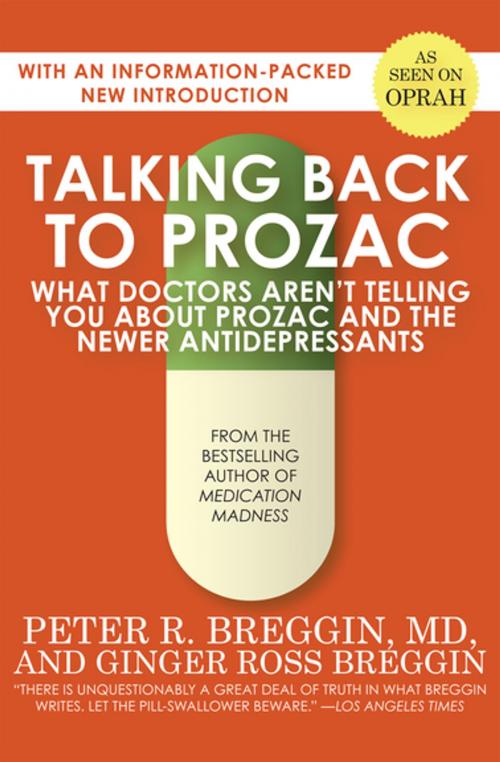Talking Back to Prozac
What Doctors Aren't Telling You About Prozac and the Newer Antidepressants
Nonfiction, Health & Well Being, Medical, Medical Science, Pharmacology, Self Help, Mental Health, Mood Disorders, Psychology| Author: | Ginger Ross Breggin, Peter R. Breggin, MD | ISBN: | 9781497617483 |
| Publisher: | Open Road Media | Publication: | April 1, 2014 |
| Imprint: | Open Road Media | Language: | English |
| Author: | Ginger Ross Breggin, Peter R. Breggin, MD |
| ISBN: | 9781497617483 |
| Publisher: | Open Road Media |
| Publication: | April 1, 2014 |
| Imprint: | Open Road Media |
| Language: | English |
A psychiatrist takes a critical look at this SSRI and newer medications that are among the most frequently prescribed drugs in America.
Prozac. Millions of Americans are on it. And just about everyone else is wondering if they should be on it, too. The claims of the pro‑Prozac chorus are enticing: that it can cure everything from depression (the only disorder for which Prozac was originally approved) to fear of public speaking, PMS, obesity, shyness, migraine, and back pain—with few or no side effects. But is the reality quite different? At what price do we buy Prozac‑induced euphoria and a shiny new personality?
Psychiatrist Peter Breggin, MD, and coauthor Ginger Ross Breggin answer these and other crucial questions in Talking Back to Prozac. They explain what Prozac is and how it works, and they take a hard look at the real story behind today’s most controversial drug:
- The fact that Prozac was tested in trials of four to six weeks in length before receiving FDA approval
- The difficulty Prozac’s manufacturer had in proving its effectiveness during these tests
- The information on side effects that the FDA failed to include in its final labeling requirements
- How Prozac acts as a stimulant not unlike the addictive drugs cocaine and amphetamine
- The dangers of possible Prozac addiction and abuse
- The seriousness and frequency of Prozac’s side effects, including agitation, insomnia, nausea, diarrhea, loss of libido, and difficulty reaching orgasm
- The growing evidence that Prozac can cause violence and suicide
- The social and workplace implications of using the drug not to cure depression but to change personality and enhance performance
Using dramatic case histories as well as scientific research and carefully documented evidence, the Breggins expose the potentially damaging effects of Prozac. They also describe the resounding success that has been achieved with more humane alternatives for the treatment of depression.
Talking Back to Prozac provides essential information for anyone who takes Prozac or is considering taking it, and for those who prescribe it.
A psychiatrist takes a critical look at this SSRI and newer medications that are among the most frequently prescribed drugs in America.
Prozac. Millions of Americans are on it. And just about everyone else is wondering if they should be on it, too. The claims of the pro‑Prozac chorus are enticing: that it can cure everything from depression (the only disorder for which Prozac was originally approved) to fear of public speaking, PMS, obesity, shyness, migraine, and back pain—with few or no side effects. But is the reality quite different? At what price do we buy Prozac‑induced euphoria and a shiny new personality?
Psychiatrist Peter Breggin, MD, and coauthor Ginger Ross Breggin answer these and other crucial questions in Talking Back to Prozac. They explain what Prozac is and how it works, and they take a hard look at the real story behind today’s most controversial drug:
- The fact that Prozac was tested in trials of four to six weeks in length before receiving FDA approval
- The difficulty Prozac’s manufacturer had in proving its effectiveness during these tests
- The information on side effects that the FDA failed to include in its final labeling requirements
- How Prozac acts as a stimulant not unlike the addictive drugs cocaine and amphetamine
- The dangers of possible Prozac addiction and abuse
- The seriousness and frequency of Prozac’s side effects, including agitation, insomnia, nausea, diarrhea, loss of libido, and difficulty reaching orgasm
- The growing evidence that Prozac can cause violence and suicide
- The social and workplace implications of using the drug not to cure depression but to change personality and enhance performance
Using dramatic case histories as well as scientific research and carefully documented evidence, the Breggins expose the potentially damaging effects of Prozac. They also describe the resounding success that has been achieved with more humane alternatives for the treatment of depression.
Talking Back to Prozac provides essential information for anyone who takes Prozac or is considering taking it, and for those who prescribe it.















